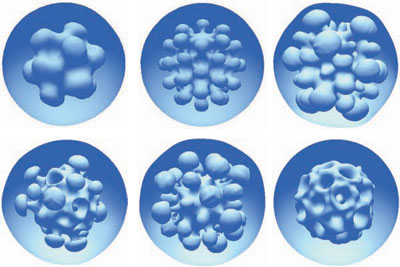Laser Fusion
Integrated Simulation for Fast Ignition
 The fast ignition approach to inertial fusion energy, in which fuel compression and its heating are separated into two distinct steps,
has been investigated by experiments. Thus we have been promoting the Fast Ignition Integrated Interconnecting code
(FI3) project in tight collaboration with Osaka University, Kyushu University, University of Hyogo and Setsunan University.
We introduce a radiation-hydro code to calculate overall fluid dynamics, a relativistic PIC code for the laser-plasma interaction,
a hybrid code for the fast electron transport and a Fokker-Planck code to compute the core heating.
The concept of the integrated simulation is shown in the figure.
The fast ignition approach to inertial fusion energy, in which fuel compression and its heating are separated into two distinct steps,
has been investigated by experiments. Thus we have been promoting the Fast Ignition Integrated Interconnecting code
(FI3) project in tight collaboration with Osaka University, Kyushu University, University of Hyogo and Setsunan University.
We introduce a radiation-hydro code to calculate overall fluid dynamics, a relativistic PIC code for the laser-plasma interaction,
a hybrid code for the fast electron transport and a Fokker-Planck code to compute the core heating.
The concept of the integrated simulation is shown in the figure.
Reference
Fast ignition integrated interconnecting code project for cone-guided targets
H.Sakagami, T.Johzaki, H.Nagatomo, K.Mima
Laser and Particle Beams 24, 191-198 (2006).
Interconnection between Hydro and PIC codes for Fast Ignition Simulations
H. Sakagami and K. Mima
Laser and Particle Beams, 22, 41-44 (2004).
Three Dimensional Rayleigh-Taylor Instability in Spherically Stagnating Systems
 In the laser fusion, the Rayleigh-Taylor (RT) instability is one of important research topics.
These figures show three-dimensional shapes of the contact surface.
Initial perturbations are given by (a) a spherical harmonics function of mode (6, 3) or (b) (12, 6),
(c) mode coupling with (6, 3) and (12, 6), and the combination of icosahedron and dodecahedron,
including (d) randomly arranged bubbles/spikes, (e) randomly arranged bubbles,
and (f) randomly arranged spikes. We found that the growth rate have depended only
on the initial pertur-bation amplitude regardless of many other conditions.
In the laser fusion, the Rayleigh-Taylor (RT) instability is one of important research topics.
These figures show three-dimensional shapes of the contact surface.
Initial perturbations are given by (a) a spherical harmonics function of mode (6, 3) or (b) (12, 6),
(c) mode coupling with (6, 3) and (12, 6), and the combination of icosahedron and dodecahedron,
including (d) randomly arranged bubbles/spikes, (e) randomly arranged bubbles,
and (f) randomly arranged spikes. We found that the growth rate have depended only
on the initial pertur-bation amplitude regardless of many other conditions.
Reference
Rayleigh-Taylor Instability in Spherically Stagnating Systems
H.Sakagami, T.Okamoto, M.Horikoshi, K.Nishihara
Anomalous Absorption Conference, Fajardo, Puerto Rico, June 26 - July 1, TP4 (2005).
Large-scale 3-D Fluid Simulations for Implosion Hydrodynamics on the Earth Simulator
H. Sakagami and H. Murai
Innovative Architecture for Future Generation High-Performance Processors and Systems, 102-108 (2004).
To Activity Top
|
|
 NIFS WEB
NIFS WEB NIFS WEB
NIFS WEB